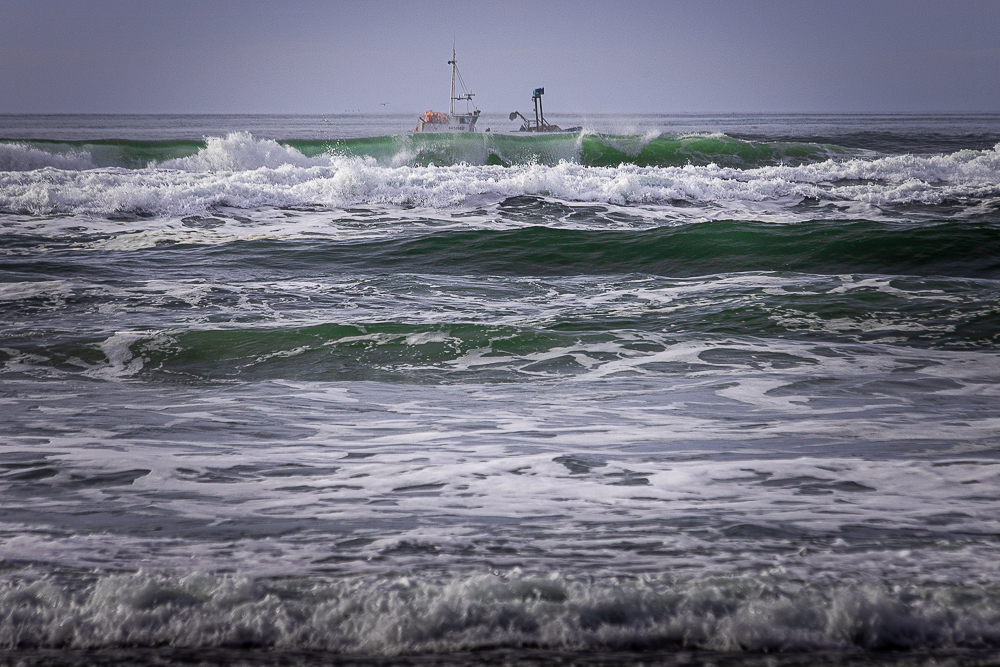EDITOR’S NOTE: More memories from a Long Beach Peninsula fisherman’s daughter …
By Victoria Stoppiello
I sit in the morning gloom, with a hot cup of coffee and the woodstove emitting a slow burn. Rain thumps against the south wall of the house. The hawthorn tree twists with each gust, explaining the spiral pattern on its trunk. The sky is a translucent gray bowl of undifferentiated clouds. A walk to the Cape D lighthouse would be a damp, blustery hike, pushing the wind before me like a boat moving through waves.
Crab season will open soon, and as happens so often, crab fishermen are welcomed by some of the year’s most demanding weather. November may not be the year’s coldest month, but it is typically the wettest, followed by December which is almost as bad. That rainfall comes on the skirts of gale force winds, which produce giant swells that can break without warning.
In November of ’98, two lives were lost while crabbing at the mouth of the Columbia. They weren’t “professionals” but their fate could await anyone. High winds and engine failure together form a threatening, if not deadly, combination. In those conditions, even the best efforts of the Coast Guard sometimes fail. Large waves snap lines, hit idled boats broadside, turn them over in an instant, and throw men overboard.
The very cold water, predicted to kill a person in a matter of minutes if left adrift without protection, takes its toll. I think about my neighbors, men who go crabbing every year. The first crab of the season come off their boats as a treat, and their safe return a blessing.
My dad was a commercial fisherman, but he never crabbed. When salmon season was over, he’d bide his time, doing nothing (to his wife’s chagrin), or working on the docks unloading the crawly beasts from boats skippered by men more adventurous than he. My dad said crab fishermen were gamblers, referring to the fact that crab harvests are cyclical, a crap shoot that produced new trucks and gear and houses one year and repossession of those same items the next. He mentioned the frequent loss of gear when a big storm sanded in the crab pots on the ocean floor, but avoided discussing the loss of life.
Perhaps he was superstitious. Perhaps one wouldn’t go out to sea to make a living in a small boat if you focused too much on those who didn’t return. Perhaps it was his laconic Finnish way to only mention the old fishermen who dropped dead of heart attacks while working on their boats in port.
He’d talk about distant disasters, like a metal boat breaking up when dropped off a big wave in the Gulf of Alaska. That crew was far away, anonymous. Besides, his prejudice favored wooden boats. When he had a 15-foot swell suddenly break under him, the Sallie bounced and flexed, but didn’t break, popped some caulking but made it to port.
He was an old fashioned guy who started fishing with his dad and, probably less by choice than the pressures of the Depression and the needs of his immigrant parents, just kept at it. So when winter’s gales were rising, he stayed on land, truly a conservative. During spring squalls, he’d chuckle about the young buck who would stick his nose out first, the one fisherman who would zip to the bar as soon as possible to just take a look, the guy willing to risk it to get a jump on the fishing. If that guy wouldn’t push it, neither would anyone else. The older guys would putt out behind the scout, listening on their radios for a report on bar conditions.
As a result, my dad made it to retirement. He sold his boat and commercial license in the early 80’s, at his wife’s urging. She wanted him to quit fishing, or at least get a survival suit, which he refused. He said better to go down quick with the boat. But she wore him down. I don’t blame her; I’d probably do the same. I don’t know how the wives handle it—knowing their men are out on a rough ocean, crossing one of the most dangerous river bars in the world, with weather that is only somewhat predictable.
Yet, I have some romantic notions. When my dad stopped fishing, something went out of him. Fifty-some years of fishing is a way of life, not just making a living. Rising before dawn, scanning the sky and water, the meditative aspect of trolling, punctuated by the adrenaline rush of fish on the line…I can see how it would be habit forming.


